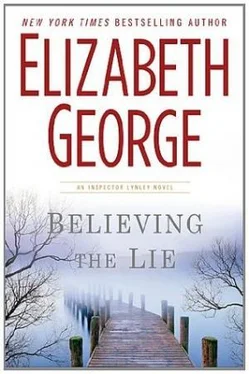He managed to avoid her quite successfully for two days although he was able to tell himself that he wasn’t attempting to avoid her at all because he spent those days hanging about the Royal Courts of Justice. There his testimony had been called for in the ongoing trial of a serial killer with whom he’d come into very close and nearly fatal contact the previous February. After those two days, however, his presence being no longer required in the vicinity of Courtroom Number One, he politely refused three requests from journalists for interviews, which he knew would end up touching upon the one subject he could not face touching upon — the death of his wife — and he returned to New Scotland Yard. There Isabelle unsurprisingly asked him if he’d been avoiding her since he’d phoned in his necessary absences not to her but to the departmental secretary. He said of course not and what possible reason had he to avoid her and he’d been at court as had been his longtime partner DS Barbara Havers. Surely Isabelle didn’t think DS Havers was also trying to avoid her?
He shouldn’t have said this last because it gave too much away, and what it gave away was the truth of the matter, which was, naturally, that he hadn’t particularly wished to have a conversation with Isabelle till he’d sorted out in his own head the reasons for his reaction at the door to her flat. Isabelle said that, frankly, avoiding her was precisely what she’d expect DS Havers to be doing as she made a regular habit of that. To which he’d replied, Be that as it may, I’m not trying to do so.
She said, “You’re angry and you’ve a right to be, Tommy. I behaved badly. He turned up with the children and I was completely unnerved. But see it from my position, please. It’s not beyond Bob to phone one of the higher-ups here and drop the word: ‘Are you aware that Acting Detective Superintendent Ardery is having it off with a subordinate officer? Just thought you might want to know.’ And he’d do that, Tommy. He would do that. And you know what would happen if he did.”
He thought she was being overly paranoid, but he didn’t say as much. To do so would lead them into an argument, if not here in her office to which she’d summoned him then somewhere else. He said, “You could be right,” and when she said, “So…?” he knew that it was another way of saying Tonight, then? so that they could see to what they’d had to postpone. Steaks, wine, a shag that would be very energetic and very, very good. Which, he realised, was the hell of it for him. Isabelle in bed was inventive and exciting, and in bed was the only place she allowed him even a moment of control over her.
He was considering her proposition when Dorothea Harriman, the lithesome and well-turned-out departmental secretary, popped into the doorway, which he’d left open. She said, “Detective Inspector Lynley?” and when he turned, “I’ve just had a call. I’m afraid you’re wanted.”
“By whom, Dee?” He assumed he was meant to return to the Old Bailey for some reason.
“Himself.”
“Ah.” Not the Old Bailey, then. Himself would be the assistant commissioner, Sir David Hillier. When Hillier beckoned, one set off to do his bidding. “Now?” he asked.
“That would be the case. And he’s not here. You’re to go straight to his club.”
“At this hour? What’s he doing at his club?”
Harriman shrugged. “Not a clue. But you’re meant to be there as soon as possible. Traffic permitting, he’d like you there in fifteen minutes. His secretary made that clear.”
“That seals it, then, doesn’t it?” He turned back to Isabelle and said, “If you’ll excuse me, guv?” When she gave a curt nod, he went on his way, everything still unresolved between them.
Sir David Hillier’s club was near Portland Place, and it was a ludicrous idea that Lynley would be able to get there from New Scotland Yard within fifteen minutes. But the mention of time suggested urgency, so he took a cab and told the driver to rat-run and, for God’s sake, to do everything possible to avoid Piccadilly Circus, a regular source of congestion. That got him to Twins — Hillier’s club — in twenty-two minutes, something of a record considering the time of day.
Twins had been fashioned from three of the few remaining town houses in the area not razed by someone’s idea of redevelopment in the nineteenth century. It was marked only by a discreet bronze plaque to the right of the doorbell and by an azure flag with the eponymous founders of the club memorialised upon it. They’d been conjoined, or so at least it seemed by their depiction on the flag. As far as Lynley knew, no one had delved deeply enough into the history of the place to learn whether this was an apocryphal account of the club’s genesis.
He was admitted not by a doorman but rather by an elderly woman in black with a crisp white pinafore apron pinned to her chest. She looked like someone from another century and, as things developed, she moved like that as well. He stated his business in an entry hung with Victorian paintings of uncertain quality that loomed above a marble draughtsboard floor. The woman nodded and negotiated something like a three-point turn before leading him to a door to the right of an impressive staircase broken by a mezzanine. There a sculpture of Venus on the half shell stood, backed by a window that arched to display the upper part of a garden, evidenced by the remains of a tree strangled by ivy.
The woman knocked, opened, and admitted him into a darkly panelled dining room, closing the door behind him. The room was empty of diners at this hour but occupied by two men at one of the linen-covered tables. They had a porcelain coffee service between them. There were three cups.
One of the men was the assistant commissioner, and the other was a bespectacled bloke who was, perhaps, too well-dressed for the time of day and the present environment, although, for that matter, so was Hillier. They seemed of an age but unlike Hillier, the other man had a receding hairline that he emphasised rather than hid, by combing his remaining locks straight back, where they lay flat against his skull in defiance of fashion and looks. His hair was uniform in colour — mousy brown would have best described it — and thus seemed to be dyed. Also in defiance of fashion, his spectacles were thick rimmed with enormous black frames, and these in combination with an astoundingly overlarge upper lip unmatched to his lower made him look like someone begging to be caricatured. This, in fact, suggested to Lynley that he knew of the man, although he couldn’t have stated his name.
Hillier did that. “Lord Fairclough,” he said. “Bernard, this is DI Lynley.”
Fairclough stood. He was far shorter than both Lynley and Hillier, perhaps five feet five inches, and he carried something of a gut on him. His handshake was firm, and during the ensuing meeting, nothing he said or did indicated that he was anything but strong willed and confident.
“David’s told me about you,” Fairclough said. “I hope we can work well together.” His accent placed him from the north and its nature surprised Lynley, for it spoke of an education decidedly not undergone in a hallowed public school. He glanced at Hillier. It was completely like the AC to rub elbows with someone in possession of a title. It was completely unlike the AC, on the other hand, to do this elbow-rubbing with someone whose title had come not via the blood but rather, like his, via the Honours List.
“Lord Fairclough and I were knighted on the same day,” Hillier said, as if he felt an explanation for their association was required. He added, “Fairclough Industries,” as a means of clarification, as if the name of Fairclough’s source of wealth — if he had any — would be apparent at once.
Читать дальше












